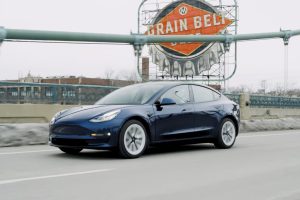- 💼 Hertz has made a “strategic decision” to reduce its electric vehicle (EV) fleet by one-third, cutting 20,000 vehicles.
- 📉 The decision is driven by a decrease in the value of Hertz’s EV fleet, with approximately $245 million of incremental net depreciation expense in Q4 2023.
- 🚗 The EVs put up for sale will still be available for rental until sold, and the proceeds will be used to purchase combustion engine vehicles due to higher demand.
- 💸 Hertz aims to improve its financials by balancing the supply and demand for EVs and expects an improvement in Adjusted Corporate EBITDA by 2024 and 2025.
- 📉 The company believes transitioning back to gas-powered vehicles will contribute to its financial recovery.
- 🚗 Tesla vehicles, part of Hertz’s EV fleet, are already listed for sale under the “Rent2Buy” program, with some prices as low as $17,700 before tax credits.
- 📉 Hertz had previously committed to purchasing 100,000 EVs from Tesla in a $4.2 billion deal in October 2021, but no specific deal was outlined, and the vehicles were bought at full price.
- 🔄 The decision to reduce the EV fleet contrasts with Hertz’s earlier expansion of its EV offerings, including models like the Tesla Model Y and cars from other manufacturers.
- 📊 Hertz’s move highlights challenges in the EV market, especially in managing depreciation costs and meeting demand expectations.
- 📈 The sale of Tesla vehicles and the shift to combustion engine vehicles align with Hertz’s strategy to navigate the evolving automotive landscape.
In a significant move that reverberates through the automotive industry, Hertz has announced a strategic decision to slash its electric vehicle (EV) fleet by one-third, equating to a reduction of 20,000 vehicles. This decision, driven by financial considerations and a reevaluation of market dynamics, sheds light on the challenges and complexities faced by companies navigating the ever-evolving landscape of electric mobility.
The Financial Pivot: An In-Depth Analysis
1. Driving Factors Behind the Decision
- The core motivation behind Hertz’s move is a substantial decrease in the value of its EV fleet.
- Q4 2023 saw an incremental net depreciation expense of approximately $245 million, signaling financial strain.
2. Transition to Combustion Engine Vehicles
- Hertz plans to use the proceeds from EV sales to bolster its combustion engine vehicle portfolio.
- The decision is rooted in the higher demand for traditional vehicles, aligning with a strategic financial recovery plan.
Balancing Act: Supply, Demand, and Financial Health
3. Strategic Goals and Financial Outlook
- Hertz aims to balance the supply and demand for EVs, anticipating an improvement in Adjusted Corporate EBITDA by 2024 and 2025.
- The transition back to gas-powered vehicles is seen as a crucial component of the company’s financial recovery strategy.
4. Rent2Buy Program and Tesla’s Role
- Tesla vehicles, part of Hertz’s EV fleet, are already listed for sale under the “Rent2Buy” program.
- Some Tesla models are priced as low as $17,700 before tax credits, reflecting a strategic approach to clearing inventory.
5. Reflections on Past Commitments
- Hertz had committed to purchasing 100,000 EVs from Tesla in a $4.2 billion deal in October 2021.
- The absence of a specific deal outline and the vehicles being bought at full price raise questions about the nature of the agreement.
Shifting Strategies: A Contrast in Approaches
6. Contrasting Movements in EV Offerings
- The decision to reduce the EV fleet contrasts sharply with Hertz’s earlier expansion into the EV market, offering models like the Tesla Model Y and cars from various manufacturers.
- This shift underscores the dynamic nature of strategic decision-making in the automotive industry.
7. Challenges in the EV Market
- Hertz’s move highlights the challenges companies face in managing depreciation costs and meeting demand expectations in the rapidly evolving EV market.
Conclusion: Adapting to the Automotive Evolution
As Hertz navigates this pivotal moment, the automotive industry witnesses a company recalibrating its strategy to align with financial realities and market demands. The move prompts broader reflections on the trajectory of the electric vehicle landscape, the intricacies of financial decision-making, and the ongoing evolution of transportation.





